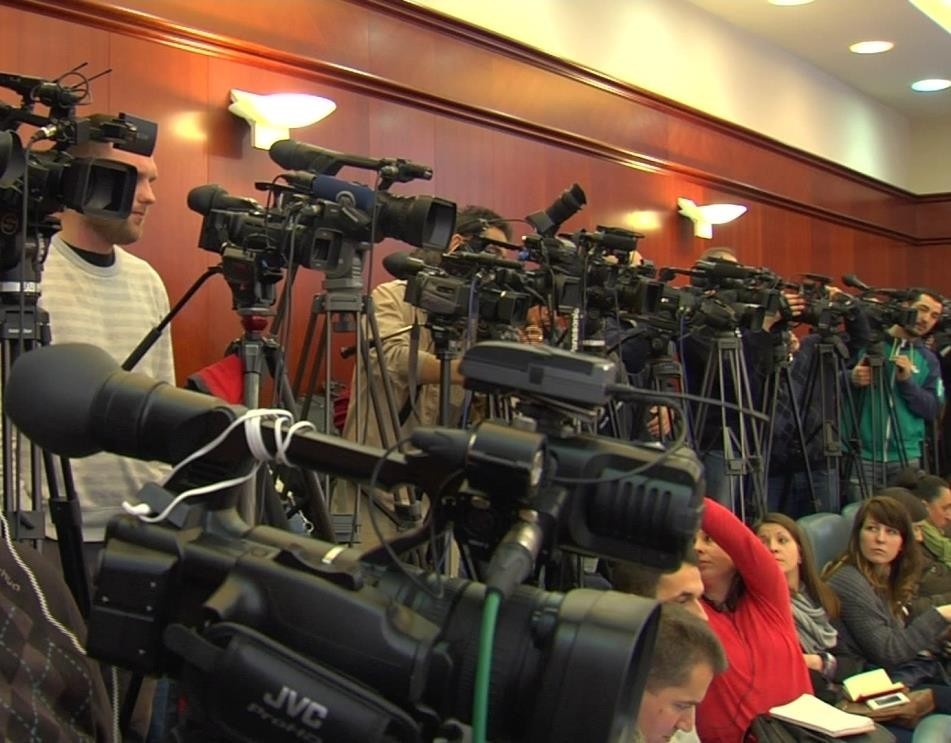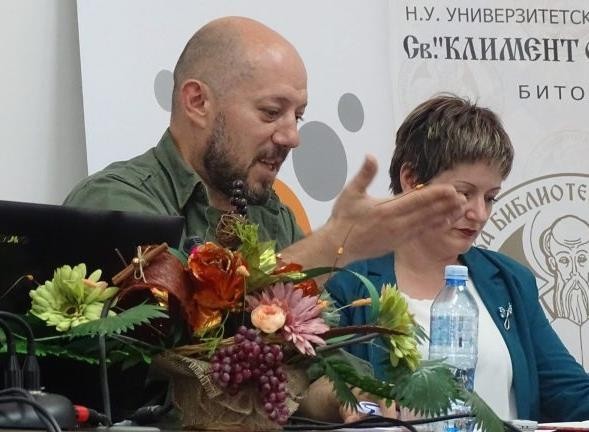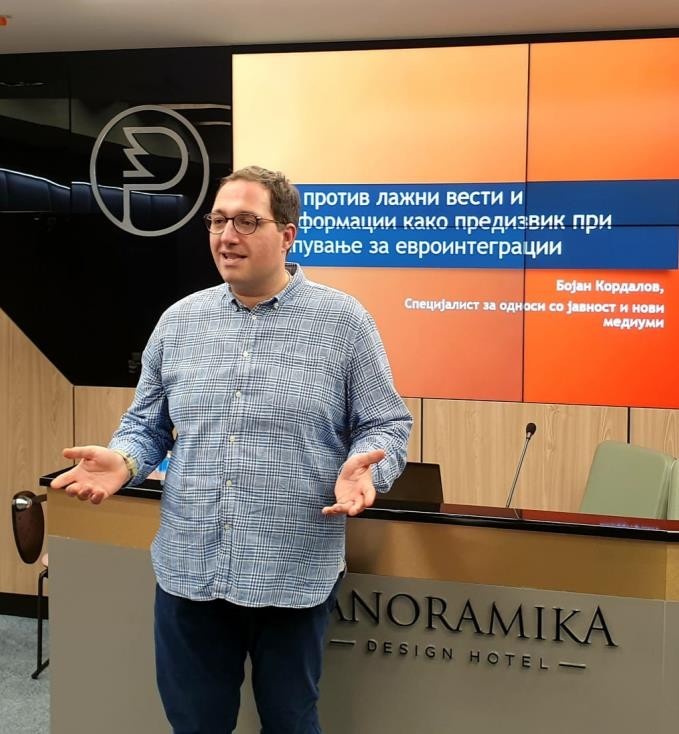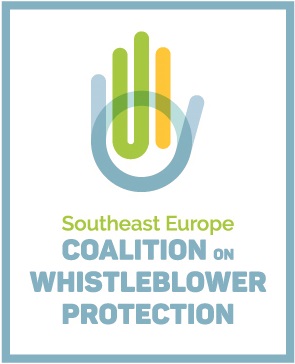Author: Mirjana Vasileva
Journalist Hristo Ivanovski believes that, despite the modern trends, there are still media outlets that are close to the government and the opposition.

“As long as the media is
influenced by different centers of power, there will be no professional journalism.
The media is constantly targeting journalists to write commissioned texts or
just read it, even though they themselves often do not know what the background
is at the moment, ”Ivanovski says.
In the recent period, he adds, “we are seeing improvements in journalism, but more responsibility is needed. In some newsrooms, there are constant pressures and often if a journalist refuses to write biased on a particular topic, he or she faces a salary penalty or threats of dismissal if he or she fails to do what he or she is told. ”
“This requires encouragement for a journalist with sound arguments to reject that kind of writing. In addition, the monthly income of journalists does not correspond to the responsibility that a journalist has, ”says Ivanovski.
Journalist Toni Glamchevski thinks that professionalism is low, but this is not due to the journalists alone. “Each of us has his own political, ideological and religious conviction, but this should not turn into
partisan behavior and the media into party media of one or the other party, in power or in opposition. It has become really difficult to differentiate what is news from a journalist or text taken from a social network or a spokesman for a party or government, ”he says.
The other problem, according to him, is the financial dependence of journalists and the media on political and economic centers of power. He emphasizes:
“So many media outlets in Macedonia have been created, especially online, but also local and national radio and television, without a true and quality written press, which certainly contributes to the unprofessionalism of the media and their reliability.” Another aspect, Glamchevski adds, is the non-giving. the true protection of journalists – as a profession. “Despite existing unions and associations, journalists are still left to their own devices against the editors and above all the bosses of those media,” he said.
According to journalist Dusko Arsovski, almost nothing has changed for the better in the media space, although expectations have been high.
“The same pests in the media (especially televisions) remained to be factors in the media market so that the owners subtly (some brutally)
turned the plate and now acted as a balancing act in the reporting. This responds to everyone”, Arsovski emphasized.
According to him, the new government should show a difference from the previous one that captured the state by concluding a new pact in which now all those who have destroyed journalism become part of a project to improve the media sphere. “Absurd of an epic scale. He went a step further. Ministers broadly and unintentionally accepted interviews with journalistic pests, thereby feeding their legitimacy but at the same time trampling on what they had previously trumpeted and criticized as opposition, ”he added.
According to him, AJM continues to be an “armchair” group that talks to diplomats, organizes round tables, participates in a dialogue with the government and so far has no concrete indication that the media is free of political influence from other centers of power.
For longtime media worker from the Center for Media Development (CRM), Dejan Georgievski, who actively participates in media policy-making, most of the provisions of the Electoral Code relating to media coverage of election campaigns are standard for all similar legislation.

“Here I mean the obligation to provide fair, balanced and impartial information and coverage of the activities of candidates, the obligation of all election participants to be granted, on equal terms, access to all types of electoral media presentation …”
What, he argues, is
controversial, despite the above-mentioned obligation to provide equal access, the
Electoral Code actively supports established parties through different
treatment in terms of quotas reserved
for paid political advertising, or in terms of quotas for ruling majority and opposition to parties not represented in Parliament or political parties established between the previous election and the election subject to media coverage.
EUROPE RESERVED TO POLITICAL ADVERTISEMENTS
In Europe there is no unified approach to this issue. Some countries, for example the United Kingdom, Ireland, Switzerland, but also Sweden, Norway or France, have partial or complete bans on political advertising in broadcasting. The UK, for example, allows the so-called. “Party political shows” referring to party conventions, conferences and similar events, defining specific time periods in which such “broadcast” must be broadcast. Other countries allow political advertising only during election campaigns, believing that transmitting such messages is crucial for citizens to make an informed choice on election day. Denmark, on the other hand, bans broadcasting political messages during the campaign to “protect voters from undue influence” and to prevent discrimination against smaller or minority parties that do not have as much funding as large established parties.
Although the
European Court of Human Rights has repeatedly stated
that such prohibitions are considered as an unlawful restriction on the
right to freedom of expression, they persist, and the regulation or self-
regulation of such issues is left to be resolved locally / nationally,
depending on the local context. , situation or traditions. The print and online
media are subject to far milder access to regulation. That has changed, however, especially in light of recent
experiences with the use and abuse of social media advertising during the 2016
US presidential election or the voting in the UK referendum on the EU (Brexit).
Some steps in the area of regulating political advertising on social networks
have already been made, and further steps are expected, both from legislators
and from major technology platforms.
Lastly, we have Twitter’s decision to ban political
advertising on the platform, as well as Facebook’s decision
not to fact-check political advertising on the network. Otherwise, like all other types of political party financing, the financing of election campaigns and media presentations is
subject to rather strict regulation.

Commissioner Bojan Kordalov, who specializes in modern technological processes in the media, says there is a need to introduce a system of media protection in the country in order to reduce the possibility for the government to influence them, including the public service, with emphasis on be placed on media self-regulation. In terms of advertising, however, he says he has never been a vocal opponent or supporter, for the simple reason that this topic is not black and white as political parties and their exponents want to put it.
“Let’s be plastic. The previous government thought it should be promoted and boasted of popular money, and the then opposition was against it. When the opposition became incumbent, its public relations spokesmen offered subsidies to the print media and even went a step further, announcing that they would fund research stories in the media, “said Kordalov.
He clarifies that “the government wants to convince the citizens that it will pay the media to criticize it.” “Believe that in neither of the two approaches (to the previous and current government) will the government persuade citizens and media workers that they are sincere. intent in media relations, that is, these measures are intended to deter political and governmental influence in the media. “
TO WHOM SERVES THE PUBLIC BROADCAST SERVICE?
The Law on Audio and Audiovisual Media Services, which has been amended several times so far, has brought the country closer to EU legislation, but the law has not been fully implemented. Concerns remain over public service reforms.
In a research entitled “The Future for the Absent Present” media expert, Klime Babunski, addresses the question of what the role of the public service broadcaster should be, taking into account the assessments and recommendations of a group of 2017 experts on the rule of law issues . “It can be said freely that what links all the changes that have been taking place in and around MRT since the early 1990s is their failure to establish and operate a public service broadcaster in the country. Therefore, MRT is much more a “blind transition street” than a public service broadcaster, “he said.
In his policy recommendations for what should happen at MRT, Babunski recommends that a necessary, large, Copernican turnaround be made at MRT to respond to the role and needs of a truly public service.
According to him, the current new Law on Amendments to the Law on Audio and Audiovisual Media Services has shown a serious intention to discontinue existing clientelist practice, the decision-making structure of MRT no longer being the result of loyalty to the party-political ruling elite, but should be the result of choosing a MRT revitalization model. However, such a principled intention, – adds Babunski – “first of all for a clear goal, at the expense of party influence to increase social influence in the management of MRT, is stalled by the opposition, which means political reality will continue to hold MRT hostage.” “.
On the other hand, the Director General of MRT, Marjan Cvetkovski, believes that the financial model, according to the legal solution, is respected in order for this service to have independence. But, he says, there are many limitations in the work because MRT’s legal status is not fully defined.
“One of the reasons for this is that some state bodies, such as the State Audit Office, under the current law see television as a public company, which should operate as such, although in the media law the public service is defined as Public. a diffuse company, ”says Cvetkovski. Another problem, according to him, is the fact that since 2015 MRT employees are included in the group of administrative staff as service providers. “Here we are preserved with serious consequences. For example, MRT cannot carry out the project of opening correspondent centers where some areas need to be rented out just because the government is not authorized to do so, but other institutions. Because of this, four correspondent centers owned by MRT have been equipped and provided with equipment, but now they cannot be used, ”says Cvetkovski.
For the Minister of Accountability and Transparency Robert Popovski, the way or model of financing for MRT may not be ideal, but it still provides greater financial stability, which makes this service now able to repay debts, operate more easily, acquire new programs, co – finance co – products.
“Yes, there are difficulties in financing on one side of the spectrum, but on the other hand, it should be reminded of the fact that the AVMS law was stuck for a year and reforms needed to start. It was only adopted in 2018 but not fully implemented to begin the procedure for selecting new members of the national service councils and AVMS as the regulatory body, ”said Popovski.
Biljana Petkovska from the Macedonian Institute for Media (MIM) says that from the work of all MRT councils so far, the general conclusion is that none of them has performed their role and task successfully. “The impression from MIM’s research is that they functioned and functioned only to formalize the decisions of the ruling parties. The issue of depoliticization of the MRT Program Council is an important issue for media independence, which we have been pointing to in recent years especially during the political crisis that ended with the Prespa Agreement. And this issue will become even more important if we get a date for negotiations with the EU, “Petkovska says.
This investigative story was produced with the financial support of the European Union. Its contents are the sole responsibility of the author and do not necessarily reflect the views of the European Union.
The end





